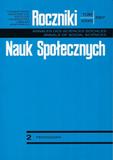Korpus nauczający Gimnazjum Wojewódzkiego (Gubernialnego) w Lublinie w latach 1832-1864
The Teaching Staff of the Regional (Governmental) Secondary School in Lublin in the Years of 1832-1864
Author(s): Ireneusz SadurskiSubject(s): Education
Published by: Towarzystwo Naukowe KUL & Katolicki Uniwersytet Lubelski Jana Pawła II
Keywords: secondary school; Lublin Government; teacher; oath of loyalty; universitiesschools; seminaries and academies; territorial and social origin; Commission of the Lublin Region; Lublin Government Authorities
Summary/Abstract: On the basis of rich and well-preserved manuscripts from the State Archives in Lublin the teaching staff of the Regional (Governmental) Secondary School in Lublin in the years of 1832-1864 have been characterised. It has been stated that the inter-rising period 94 persons were teachers in the school. 54 of them were prepared for teaching at national and foreign universities; 19 were graduates of Warsaw University, i.e. 22.09% of the staff with university diplomas. As tsarism put into practice its policy of Russification, more and more graduates from the universities of the Russian Empire arrived at the Lublin Secondary School, One can see at the turn of the 1840s and 1850s. In a group of 26 persons dominated mainly graduates of Moscow and Sanct Petersburg Universities, hence 30.23% of the staff were lecturers from Russia, including distant universities in Charków i Dorpat. Those graduates obtained their diplomas from Moscow, Sanct Petersburg, Charków, and Dorpat. Let us stress firmly that 85% of them were Poles, and only 5% indigenous Russians. The staff of the Lublin Secondary School was also composed of lecturers from Prussian universities in Berlin, Królewiec, Wrocław, and Frankfurt, the universities in the Austrian Empire (Vienna, Lvov), and the Free Town of Kraków. The remaining teachers of the Secondary School (25.58%) had qualifications from the Pedagogic Institutes and Courses, 11.62% of them from Theological Seminaries and Academies, whereas 12.79% were graduates of secondary schools. Being appointed, the teachers had to take an oath of loyalty towards the monarch and sign it personally. This closed the stage of accepting a candidate to work and opened for him an opportunity to work as a teacher.
Journal: Roczniki Nauk Społecznych
- Issue Year: 35/2007
- Issue No: 2
- Page Range: 143-166
- Page Count: 24
- Language: Polish

